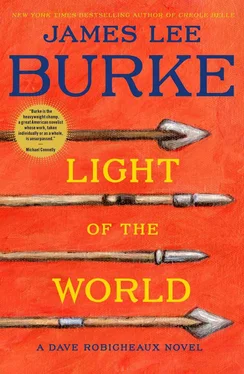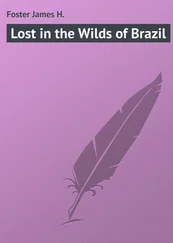“How do you feel about it?”
She was sitting in the chair across from him. She stared at the floor, her face still lined with sleep. She was wearing pink tennis shoes without socks, and somehow they made Clete feel guilty about the childhood she’d deserved but been denied. “I’m alive, he’s dead. What should I feel? I don’t feel anything,” she said.
“Don’t lie.”
“I fired on the truck in hot blood. I could have let the guy on the riverbank go. He had two holes in him. He probably would have bled out and died on the riverbank and wouldn’t have floated away. We’d know who he was. I blew it.”
“He was out to kill you, kid. He got what he deserved. I’m proud of you.”
“I heard a voice inside my head. The voice said, ‘Welcome back, baby doll,’ or something like that.”
Clete’s eyes went away from her and looked at nothing. “Like the voice that was telling you you’re back on that old-time rock and roll?” he said.
“I don’t like to think in those terms anymore.”
“You stood directly in front of a speeding truck and took everything they could throw at you. How many people have that kind of courage? Don’t you dare blame yourself for being the noble woman you are.”
“I don’t need the Valium, Dad.”
“Don’t be smart. You belong to a special club. You paid a lot of dues to join it. Stop beating up on yourself, and don’t ever mock our relationship.”
Her face showed no expression and he wondered if he had said too much.
“Who were those guys? Who sent them?” she said.
“Think of it this way: At least one of them won’t be back.”
“I want to be a film director. I’m supposed to go over on the east side of the Divide in two days. How’d we end up in this mess?”
He didn’t answer. He got an ice tray and a bottle of grape juice and a bottle of Canada Dry out of the refrigerator and filled two glasses. He dropped a lime slice in each. “This is the best drink in the world, did you know that?” he said. “You’re my kid. In spite of the fact that your old man was a deadbeat and a drunk, you turned out to be the best kid on the planet. None of this other stuff means diddly-squat on a rock. You roger that?”
“You’re the worst actor I’ve ever known,” she replied. “But you’re a good guy just the same. Now change your shirt, for Christ’s sake.”
That afternoon I was watering Albert’s flowers for him when I saw Sheriff Elvis Bisbee come up the driveway in a cruiser. He walked into the yard and stood in the shade of the house, a manila envelope in his hand, a relaxed expression on his face. Clete was grilling hamburgers up on the deck, glancing over his shoulder at us, pressing a spatula down on the meat.
“I want to talk with you and your pal at the same time, Mr. Robicheaux,” the sheriff said.
Clete closed the top on the barbecue and came down the steps into the shade. The wind was up, the air cool and smelling of cut grass and the water sprinklers in the yard; Albert’s horses were galloping in the pasture, hooves drumming, tails flagging. It was a fine afternoon. I didn’t want to be at odds with the sheriff, who seemed an admirable man.
“Last night there was a shoot-out not far from the Higgins Street Bridge,” he said. “The person who called in the 911 claims a woman driving a vintage Cadillac convertible was involved. Who might that be?”
Clete’s eyes showed no expression.
“Can you venture a guess, Mr. Purcel?”
Clete watched a robin light on the branch of an ornamental crab apple. “Shit happens,” he replied.
“There’s another interesting development. We found Gretchen Horowitz’s fingerprints inside Bill Pepper’s home,” the sheriff said.
Clete nodded gravely. “If I had a man like that in my department, I’d pay a reward to the person who put him on the bus. If I knew where his grave was, I’d piss on it.”
“We also found an abandoned pickup with a tire blown off the rim. Somebody had wiped the inside and the door handles with motor oil, so we couldn’t lift any prints.”
“Sounds like you’ve got some pretty sharp criminals around here,” Clete said.
“We have our share of visiting comedians, too,” the sheriff said. “Let me line this out a little more clearly so there’s no misunderstanding between us. This isn’t the O.K. Corral. We’re not a collection of hicks. You gentlemen don’t make the rules.”
“We can’t argue with you on that,” I said.
“You don’t know anything about a shooting by the bridge, Mr. Robicheaux?”
“I don’t know what to tell you, sir,” I replied.
“Here’s how it went down, Sheriff,” Clete said. “Two guys tried to smoke my daughter. One guy got away in a pickup, Kansas tags. The other guy’s whereabouts are unknown. I told my daughter not to call it in because I didn’t want to see her hung out to dry. Bill Pepper was a dirty cop. You know it and so do I. First time, shame on them, know what I mean?”
“You don’t trust us?”
“We didn’t deal the play,” Clete said.
“I’ve got a surprise for both of you,” the sheriff said. “My biggest concern isn’t the shooting by the bridge. Two witnesses said your daughter acted in self-defense, Mr. Purcel. Evidently, one man was badly wounded, so I expect he’ll show up one way or another. I want you to look at some photos.”
He untied the manila envelope and took out at least a dozen crime scene photographs. “The former sheriff was an obsessed man when it came to crimes against children and women. Beginning in 1995, there were a number of murders in the Northwest that seemed to bear similarities. The first one was right here in the Bitterroot Valley, followed by one in Billings, then Seeley Lake, Pocatello, and Spokane.” He began placing the photos in a line on top of the stone wall by the front entrance. “There were never any forensics that would tie one homicide to another, except they were all obviously committed by a sexual deviant. I’d like both of you to study these and tell me what you see.”
Crime scene photography, especially homicide, is never pleasant to look at. Defense attorneys try to suppress it as inflammatory, more so as the trial nears the sentencing phase. It’s invasive in nature and seems to degrade the victims in death. Their eyes are fixed and stare at nothing; their mouths often hang open, as though they realized in their last seconds the irreparable nature of the fate imposed upon them. As you gaze at their photos, you identify with them, and for just a moment you understand the terrible nature of the crime that, in retrospect, you are being made witness to: These people, made out of the same clay as you, were not simply killed; they were robbed of their dignity, their hope, their identity, their belief in humanity, and sometimes their religious faith. As you gaze at these photographs, you are tempted to revisit your objections to capital punishment.
Clete picked up the photos and looked at each and passed them to me. “What do you want us to say?” he asked the sheriff.
“You think these people were killed by the same guy?”
“The killer was into bondage and torture. He was big on suffocation and using plastic bags.”
“What else?” the sheriff asked.
“The women’s dresses have been pulled up. You or somebody else have drawn felt-tip circles on the women’s legs.”
“That’s where the killer or killers ejaculated on them.”
“Most of these bastards mark their territory,” Clete said.
“In the same way at every homicide scene?” the sheriff said.
“What difference does our opinion make?” I said.
“The guy who killed Angel Deer Heart ejaculated on her.”
“Where?” I said.
Читать дальше












